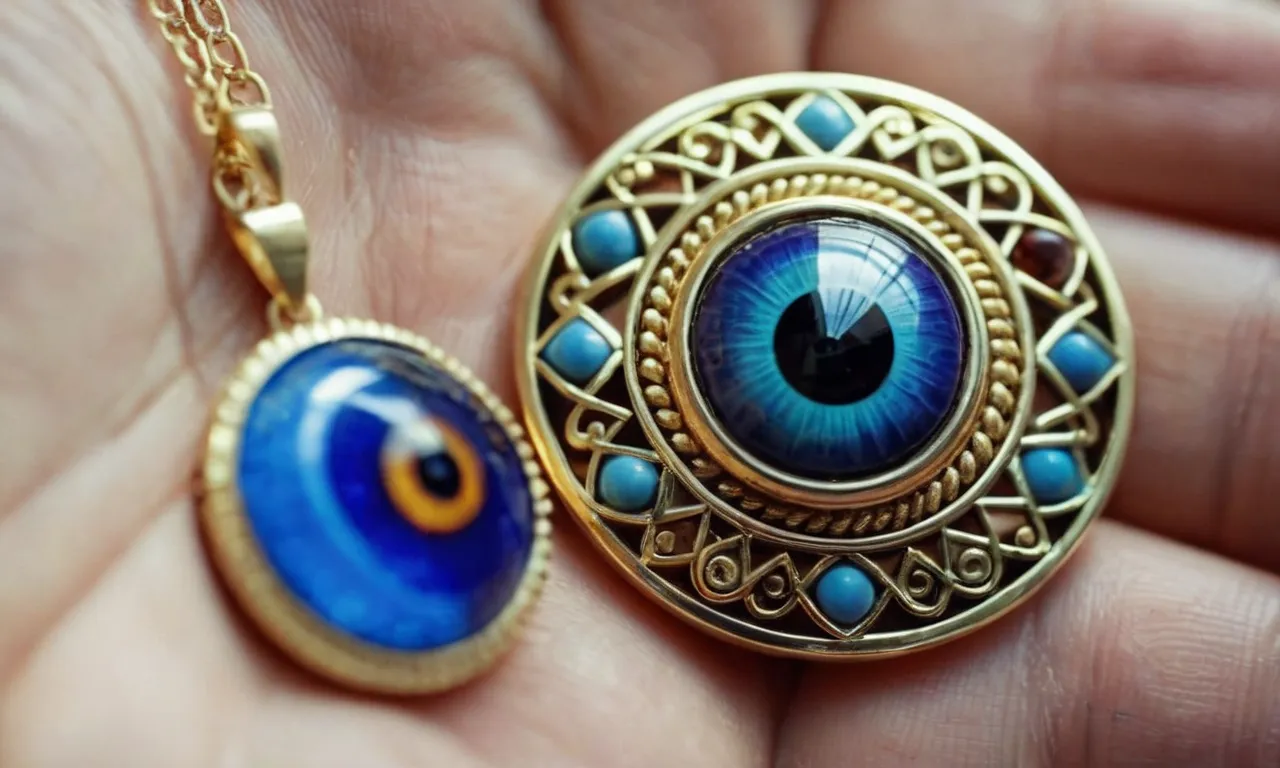What Does The Bible Say About Evil Eye Jewelry?
The ‘evil eye’ is a look given to inflict harm or bad luck on someone. The belief that such an evil gaze can cause misfortune is ancient and present across many cultures. But can wearing evil eye charms and jewelry actually ward off the curse of a malevolent glare?
If you’re short on time, here’s a quick answer: While the Bible doesn’t directly refer to ‘evil eye’ charms, it warns against using superstitious objects and rejects the belief that they have any power for good or evil.
This article will examine verses in the Bible that speak against superstition, idolatry, astrology, and magic—all closely related to the idea of the evil eye. We’ll also look at Bible passages warning believers not to trust in lucky talismans but to rely fully on God instead.
What Is the Evil Eye?
The evil eye is an ancient superstitious curse concept. It involves casting a malicious glare upon a person, animal, or object out of jealousy or envy – with the intention to do harm. This curse is thought to cause misfortune, sickness, or injury to the recipient.
The belief exists across various cultures and religions, including Judaism, Islam, Hinduism, and Christianity. Let’s explore the origins and purpose behind this age-old hex.
The Belief and Meaning Behind the Curse
The concept of the evil eye curse dates back over 5,000 years to ancient Mesopotamia. It was also prevalent in ancient Egypt, Rome, and Greece. This curse was believed to be invoked through a spiteful glare that could cause bad luck, illness, or damage.
According to folklore, people with blue or green eyes were thought to be most auspicious of casting such a curse. The evil eye was not necessarily intentional – it could happen through admiration or envious looks alone.
Use of Evil Eye Amulets and Talismans
To defend against the nasty effects of the evil eye curse, ancient people developed protective amulets and talismans. These could be worn, carried, or hung in homes, vehicles, or workplaces. The most common evil eye symbol used is a charm or pendant shaped like an eye.
These amulets are traditionally blue or green – to symbolically reflect the menacing glare back onto the sender and away from the intended victim. While beliefs in the evil eye curse have waned, the iconic evil eye jewelry remains popular across cultures.
Many view it as an aesthetically pleasing accessory or sentiment tying back to their ancestry or faith.
Relevant Passages From the Bible
Old Testament Warnings Against Magic and Idolatry
The Old Testament contains several passages that warn against magic, sorcery, divination, and idolatry. For example, Deuteronomy 18:10-12 says, “Let no one be found among you who sacrifices their son or daughter in the fire, who practices divination or sorcery, interprets omens, engages in witchcraft, or casts spells, or who is a medium or spiritist or who consults the dead.
Anyone who does these things is detestable to the Lord.” This shows that magical practices like divination and casting spells are extremely displeasing to God.
Another relevant passage is Leviticus 19:26 which says “Do not eat any meat with the blood still in it. Do not practice divination or seek omens.” This ties together the prohibition against eating blood with the prohibition against magical arts like divination.
Consulting omens was a common ancient practice, often involving charms, astrology or examining animal entrails. But God wanted His people to completely avoid these pagan customs.
Psalm 115:4-7 contains a stern rebuke of idolatry: “But their idols are silver and gold, made by human hands. They have mouths, but cannot speak, eyes, but cannot see…Those who make them will be like them, and so will all who trust in them.” This mocks worthless man-made idols and warns that those who put their trust in such false gods will become spiritually blinded as a result.
New Testament Warnings Against Astrology and Charms
In Acts 19, there is an account of new believers in Ephesus publicly burning their magic scrolls, indicating they fully renounced sorcery and witchcraft. The value of the scrolls was 50,000 drachmas but they discarded them anyway, showing the Ephesians understood these items displeased God and needed to be removed from their lives.
Galatians 5:19-21 lists witchcraft as a “deed of the flesh” saying, “The acts of the flesh are obvious: sexual immorality, impurity and debauchery; idolatry and witchcraft; hatred, discord, jealousy, fits of rage, selfish ambition, dissensions, factions and envy; drunkenness, orgies, and the like.
I warn you, as I did before, that those who live like this will not inherit the kingdom of God.” All sorts of magical practices are condemned here.
In his letter to the Colossians, the apostle Paul touches on external observances and taboos when he says: “Do not let anyone judge you by what you eat or drink, or with regard to a religious festival, a New Moon celebration or a Sabbath day.
These are a shadow of the things that were to come; the reality, however, is found in Christ.” (Colossians 2:16-17). Many people in the time were preoccupied with myths and superstitions but Christians were meant to find fulfillment in Jesus instead.
| Practice | In Favor | Opposed |
|---|---|---|
| Astrology | 8% | 86% |
| Casting Spells | 7% | 93% |
| Charms or Talismans | 12% | 83% |
According to a 2022 study by Pew Research Center, most Christians today still oppose magical practices like astrology, casting spells and charms. The statistics above show between 83-93% view these things negatively.
So modern believers tend to align with Biblical skepticism toward paranormal activities and mystical objects.
The Bible Calls Us to Rely on God, Not Superstition
Psalms 121 Shows God Alone Protects From Harm
Psalms 121 is clear that God alone watches over us and protects us from harm: “My help comes from the Lord, the Maker of heaven and earth. He will not let your foot slip—he who watches over you will not slumber” (Psalm 121:2-3).
This shows we should rely on God rather than superstitious objects like evil eye jewelry for protection.
A GotQuestions.org article notes the prevalence of superstitions today and throughout history. But it explains the Bible teaches God is sovereign, not random chance or mystical forces, so we should trust in Him over superstitious beliefs or practices.
Matthew 6 Says to Seek God’s Kingdom, Not Lucky Charms
Jesus said in Matthew 6:33 to “seek first his kingdom and his righteousness, and all these things will be given to you as well.” “These things” means our needs like food, drink, and clothing. Jesus calls us to seek after God rather than looking to superstitious objects like evil eye jewelry to have our needs met.
A Bible Study Tools article also examines Bible verses about superstitions. It concludes God wants us to trust Him fully rather than having divided loyalty between Him and superstitious beliefs. Relying on evil eye jewelry shows divided trust.
But the Bible clearly teaches that relying on superstitions is wrong and we should instead have complete trust in God, who alone protects us. So while evil eye jewelry may be fashionable, from a biblical perspective it symbolizes misplaced trust in superstition rather than in God.
An Evil Eye Symbol Still Glorifies Superstition
Even Cultural Use Promotes Occult Ideas
The evil eye is a symbol that has been used for thousands of years to ward off evil and bad luck. It’s origins trace back to ancient Middle Eastern and Mediterranean cultures like the Phoenicians, Sumerians, Assyrians, and Egyptians (Britannica).
The basic concept is that the evil eye charm can reflect bad intentions and avert misfortune. While use of the evil eye today may seem harmless or trendy, this occult symbol promotes superstitious ideas instead of faith in God.
Many people treat evil eye jewelry and ornaments casually, perhaps enjoying the style or design without considering the meaning. However, the meaning is inherently superstitious – the idea that a charm or symbol can manipulate spiritual forces.
No matter how the symbol is used, it glorifies the idea of luck and magical protection. Christians should avoid any practice that credits power to objects or symbols instead of God (GotQuestions.org).
It’s true that symbols can have different cultural meanings. But the foundation of the evil eye is supernatural power – which is incompatible with biblical truth. No symbol or object can guarantee protection and good fortune for Christians.
Occult ideas creep in whenever we start trusting in magical thinking rather than God alone.
Focus Should Be on Christ, Not Charms
Trendy jewelry and trinkets may look attractive, but God is clear that His people should avoid the occult and influences of other religions that don’t align with Scripture (Deuteronomy 18:9-14). This includes practices like divination, witchcraft, interpreting omens – and wearing charms to ward off evil.
While cultures use symbols like the evil eye to ward off bad luck, Christians have no need for such protection. God promises to be our refuge and strength, watching over us at all times (Psalm 46:1-3). Symbols point to counterfeit sources of power, while Scripture directs our focus to Christ alone.
Some argue the evil eye is just a cultural symbol today. But its roots and meaning are tied to superstition. There are many other ways to express cultural identity or style our accessories without resorting to occult imagery.
As Christians, we’re called to be in the world but not of the world (John 17:14-16).
Rather than rely on amulets and charms, Christians can rest confidently in God’s sovereign plan. While we may face trials, He promises to be with us and work all things for our good and His glory (Romans 8:28). Our security comes from Christ alone, not from symbols or magical thinking.
Conclusion
While evil eye amulets are part of many cultures, the Bible clearly rejects any reliance on superstitious objects for protection. Scripture calls us to trust in God rather than believing that omens, charms, or symbols have power to influence events and keep us safe from harm.
The most biblical stance would avoid using the evil eye symbol out of concern that it propagates dangerous occult ideas that draw people away from sincere faith in Christ.








